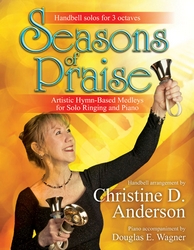- |
User Links
Faith in Christ Our Sacrifice

Not all the blood of beasts
Author: Isaac Watts (1709)Published in 603 hymnals
Printable scores: PDF, MusicXMLAudio files: MIDI
Representative Text
1. Not all the blood of beasts
On Jewish altars slain
Could give the guilty conscience peace
Or wash away the stain.
2. But Christ the heav'nly Lamb
Takes all our sins away,
A sacrifice of nobler name
And richer blood than they.
3. My faith would lay its hand
On that dear head of thine,
While, alike a penitent, I stand,
And there confess my sin.
4. My soul looks back to see
The burdens thou didst bear
When hanging on the curséd tree,
And hopes my guilt was there.
5. Believing, we rejoice
To see the curse remove;
We bless the Lamb with cheerful voice
And sing his bleeding love.
Source: Hymns and Devotions for Daily Worship #299
Author: Isaac Watts
 Isaac Watts was the son of a schoolmaster, and was born in Southampton, July 17, 1674. He is said to have shown remarkable precocity in childhood, beginning the study of Latin, in his fourth year, and writing respectable verses at the age of seven. At the age of sixteen, he went to London to study in the Academy of the Rev. Thomas Rowe, an Independent minister. In 1698, he became assistant minister of the Independent Church, Berry St., London. In 1702, he became pastor. In 1712, he accepted an invitation to visit Sir Thomas Abney, at his residence of Abney Park, and at Sir Thomas' pressing request, made it his home for the remainder of his life. It was a residence most favourable for his health, and for the prosecution of his literary… Go to person page >
Isaac Watts was the son of a schoolmaster, and was born in Southampton, July 17, 1674. He is said to have shown remarkable precocity in childhood, beginning the study of Latin, in his fourth year, and writing respectable verses at the age of seven. At the age of sixteen, he went to London to study in the Academy of the Rev. Thomas Rowe, an Independent minister. In 1698, he became assistant minister of the Independent Church, Berry St., London. In 1702, he became pastor. In 1712, he accepted an invitation to visit Sir Thomas Abney, at his residence of Abney Park, and at Sir Thomas' pressing request, made it his home for the remainder of his life. It was a residence most favourable for his health, and for the prosecution of his literary… Go to person page >Text Information
| First Line: | Not all the blood of beasts |
| Title: | Faith in Christ Our Sacrifice |
| Author: | Isaac Watts (1709) |
| Meter: | 6.6.8.6 |
| Language: | English |
| Copyright: | Public Domain |
English
- A Baptist Hymn Book, Designed Especially for the Regular Baptist Church and All Lovers of Truth #d531
- A Book of Worship for the Use of the Evangelical Lutheran Church ... of the Church of the Redeemer, Richmond, Virginia #d113
- A Choice Collection of Hymns, and Spiritual Songs, designed for the devotions of Israel, in prayer, conference, and camp-meetings...(2nd ed.) #35
- A Choice Selection of Hymns and Spiritual Songs for the use of the Baptist Church and all lovers of song #184
- A Collection of Evergreen Hymns, for All the People. New ed. #d97
- A Collection of Familiar and Original Hymns and Tunes #d55
- A Collection of Familiar and Original Hymns with New Meanings. 2nd ed. #25
- A Collection of Hymns #15
- A Collection of Hymns and Prayers, for Public and Private Worship #111
- A Collection of Hymns for Public and Private Devotion #d169 10 shown out of 364
Welsh
Not all the blood of beasts. I. Watts. [Christ the Heavenly Sacrifice.] First published in his Hymns and Spiritual Songs, enlarged edition, 1709, Bk. ii., No. 142, in 5 stanzas of 4 lines, and headed "Faith in Christ our Sacrifice." It was brought into use in the Church of Eng-land through. M. Madan's Psalms & Hymns, 1760; and A. M. Toplady's Psalms & Hymns, 1776. In these collections alterations were introduced which, with additions from other sources, have been handed down to modern hymn-books. These changes in the text are the outcome of religious convictions and controversy. The most striking instance of this fact is given in the Wesleyan Hymn Book new edition, 1875.
In some American collections the hymn begins, "No blood of bird or beast;" but its use in this form is limited. With one or more of the above alterations in the text, it is in extensive use in all English-speaking countries. It has also been translated into several languages. The Latin translation by R. Bingham in his Hymnologia Christiana Latina, 1871, is "Omnis sanguis bestiarum."
--Excerpts from John Julian, Dictionary of Hymnology (1907)
Notes
Not all the blood of beasts. I. Watts. [Christ the Heavenly Sacrifice.] First published in his Hymns and Spiritual Songs, enlarged edition, 1709, Bk. ii., No. 142, in 5 stanzas of 4 lines, and headed "Faith in Christ our Sacrifice." It was brought into use in the Church of Eng-land through. M. Madan's Psalms & Hymns, 1760; and A. M. Toplady's Psalms & Hymns, 1776. In these collections alterations were introduced which, with additions from other sources, have been handed down to modern hymn-books. These changes in the text are the outcome of religious convictions and controversy. The most striking instance of this fact is given in the Wesleyan Hymn Book new edition, 1875.
In some American collections the hymn begins, "No blood of bird or beast;" but its use in this form is limited. With one or more of the above alterations in the text, it is in extensive use in all English-speaking countries. It has also been translated into several languages. The Latin translation by R. Bingham in his Hymnologia Christiana Latina, 1871, is "Omnis sanguis bestiarum."
--Excerpts from John Julian, Dictionary of Hymnology (1907)


 My Starred Hymns
My Starred Hymns




